
Do you need to replace your Trailer Tires?
Did you know that your Trailer Tires may be worn out even though they still have plenty of tread left? This is because trailer
tires have to carry a lot of weight all the time, even when not in use. It is actually better for the tire to be rolling down the road
than to sit still. During use the tire releases lubricants that are beneficial to tire life. Using the Trailer Tires often also helps
prevent flat spots from developing on the tire.
If one tire fails, the remaining tires will have to suddenly compensate by supporting the increased load the failed tire was
carrying. This sudden increase of weight may overload the other tires causing a chain reaction blowout or other internal
damage. If you have experienced a blowout, make sure you check the other tires for damage and/or take your tires to a local
tire shop for evaluation by the experts.
The main cause of tire failure is underinflation. Check your tires at least once a month for proper inflation levels. Carlisle Tire
and Wheel recommends adjusting the air pressure to the Maximum pounds per square inch (PSI) listed on the sidewall of the
tire. If you inflate the tires to less than the maximum inflation level, you dramatically reduce the load carrying capacity of the
tire.
Tires are not completely impervious to air loss; in fact tires can lose 1 to 3 PSI per month. This is because molecules of air
under pressure weave their way from the inside of the tire through the rubber to the outside. A drop in air pressure could cause
the tire to become overloaded, leading to excessive heat build up. If a Trailer Tire is under-inflated even for a short period of
time, the tire could suffer internal damage. The Rubber Manufacturing Association (RMA) states that a tire run at less than
80% of the maximum inflation could cause damage to the tire. Again, if you feel that your tires have been run underinflated
have them checked professionally at a local tire service center.
High speed towing in hot conditions degrades Trailer Tires significantly. As heat builds up during driving, the tire’s internal
structure starts to breakdown compromising the strength of the tire. It is recommended to not exceed 60 Miles per hour (MPH)
while towing a trailer.
3 to 5 years is the average life expectancy of a Trailer Tire. After three years you should consider replacing your Trailer tires
with new ones even if the tires have adequate tread depth left. After five years Trailer Tires are considered worn out and
should be replaced.
Imagine staying in the sunlight all day everyday with no sunscreen! This is what your tires have to endure daily. If you are
storing your Trailer for an extended period, make sure that you store the tires in a cool dry place such as a garage or under a
shade tree with tire covers to protect your Trailer Tires from the harsh effects of the sun. A thin piece of wood under the tires
during storage will extend your Trailer Tires life.
- Summary Maintenance Tips -
• Keep your tires air pressure at the Maximum PSI recommended on the sidewall of the tire
• Keep a cap on your valve stem to prevent contamination of the internal rubber valve
• Always travel with a spare and check your spare tires air pressure along with the other tires
• If you experience a blowout, slowly move over to the right off the road to change your tire and check the other tires for
possible damage
• Don’t overload your Trailer Tires. The maximum load is listed on the sidewall of your Trailer Tires
• Give your Trailer Tires a visual check before each trip
• Keep your Trailer Tires in a cool dry place and out of direct sunlight during storage
• Replace your Trailer Tires every 3 to 5 years
-
 1
1
Carlisle 8353054 Owner's manual
- Type
- Owner's manual
Ask a question and I''ll find the answer in the document
Finding information in a document is now easier with AI
Other documents
-
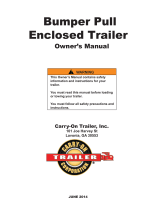 Carry-On Trailer 6X10LCGRECBN Operating instructions
Carry-On Trailer 6X10LCGRECBN Operating instructions
-
Carry-On Trailer 5X8SGEC User manual
-
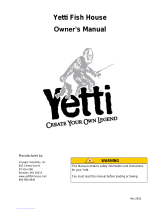 Yetti fish house Owner's manual
Yetti fish house Owner's manual
-
Mini 2023 Tire Manufacturer User guide
-
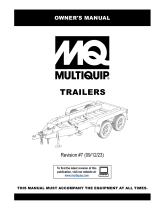 MQ Multiquip Trailers Operating instructions
MQ Multiquip Trailers Operating instructions
-
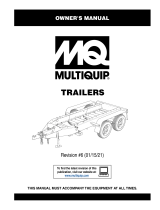 MQ Multiquip Trailers Operating instructions
MQ Multiquip Trailers Operating instructions
-
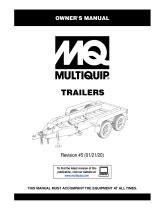 MQ Multiquip Trailers Operating instructions
MQ Multiquip Trailers Operating instructions
-
Craftsman 220 User manual
-
Wacker Neuson PT6LT User manual
-
Wacker Neuson PT6LT User manual





